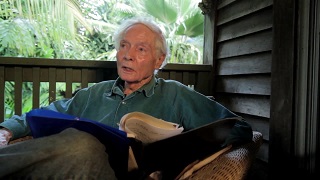De Amerikaanse dichter, schrijver en vertaler William Stanley Merwin werd geboren in New York op 30 september 1927. Merwins vader was een presbyteriaanse predikant. Hij groeide op in Union City (New Jersey) en vanaf 1936 in Scranton (Pennsylvania). Na zijn afstuderen aan de Princeton-universiteit in 1952 maakte hij reizen door Frankrijk, Engeland en Spanje. Op Majorca leerde hij de schrijver Robert Graves kennen, aan wiens zoon hij les gaf. Graves riep het enthousiasme voor de Griekse en Romeinse mythologie in hem wakker. Hij trouwde met de vijftien jaar oudere Dido Milroy en het paar vestigde zich in Londen, waar hij met vertaalwerk de kost verdiende en zijn eerste dichtbundel schreef, die hem in 1952 de ‘Yale Series of Younger Poets Award’ opleverde. Zijn eerste bundels stonden nog sterk onder invloed van Robert Graves en Wallace Stevens, maar in de jaren zestig begon hij te experimenteren met de vorm, wat hij theoretisch onderbouwde met essays als “On Open Form”. Hij verwerkte ook thema’s uit zijn eigen leven, bijvoorbeeld in “The Drunk in the Furnace” (1960). Zijn autobiografie “The Miner’s Pale Children” verscheen in 1970. Voor “The Carrier of Ladders” kreeg hij in 1971 zijn eerste Pulitzerprijs. In deze jaren was de Vietnamoorlog een belangrijk thema in zijn werk. In 1968 keerde Merwin terug naar de VS, terwijl zijn vrouw in Europa achterbleef. Hij werd in 1972 opgenomen in de American Academy of Arts and Letters. In de latere decennia van zijn leven woonde hij op Hawaï. Hij scheidde van Dido Milroy en trouwde in 1983 met Paula Dunaway. De natuur werd nu het overheersende thema in zijn poëzie. In 1993 werd hij ook lid van de American Academy of Arts and Sciences. Na “Folding Cliffs: A Narrative” (1998) verschenen in 2006 verdere memoires onder de titel “Summer Doorways”. In 2009 kreeg hij zijn tweede Pulitzerprijs voor poëzie, voor “The Shadow of Sirius”. Sinds 2017 had hij de eretitel van 17e Poet Laureate van de Verenigde Staten.
My Friends
My friends without shields walk on the target
It is late the windows are breaking
My friends without shoes leave
What they love
Grief moves among them as a fire among
Its bells
My friends without clocks turn
On the dial they turn
They part
My friends with names like gloves set out
Bare handed as they have lived
And nobody knows them
It is they that lay the wreaths at the milestones it is their
Cups that are found at the wells
And are then chained up
My friends without feet sit by the wall
Nodding to the lame orchestra
Brotherhood it says on the decorations
My friend without eyes sits in the rain smiling
With a nest of salt in his hand
My friends without fathers or houses hear
Doors opening in the darkness
Whose halls announce
Behold the smoke has come home
My friends and I have in common
The present a wax bell in a wax belfry
This message telling of
Metals this
Hunger for the sake of hunger this owl in the heart
And these hands one
For asking one for applause
My friends with nothing leave it behind
In a box
My friends without keys go out from the jails it is night
They take the same road they miss
Each other they invent the same banner in the dark
They ask their way only of sentries too proud to breathe
At dawn the stars on their flag will vanish
The water will turn up their footprints and the day will rise
Like a monument to my
Friends the forgotten
It Is March
It is March and black dust falls out of the books
Soon I will be gone
The tall spirit who lodged here has
Left already
On the avenues the colorless thread lies under
Old prices
When you look back there is always the past
Even when it has vanished
But when you look forward
With your dirty knuckles and the wingless
Bird on your shoulder
What can you write
The bitterness is still rising in the old mines
The fist is coming out of the egg
The thermometers out of the mouths of the corpses
At a certain height
The tails of the kites for a moment are
Covered with footsteps
Whatever I have to do has not yet begun

W. S. Merwin (New York, 30 september 1927)
